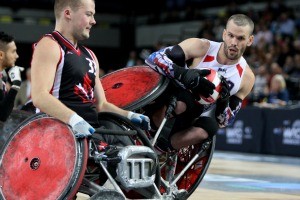 Rio 2016 - Paralympic Games, 17-18 September 2016
Rio 2016 - Paralympic Games, 17-18 September 2016- The Paralympic Games and the Promotion of the Rights of Persons with Disabilities, by Sir Philip Craven
- UNESCO International Charter of Physical Education, Physical Activity and Sport (English, French, Spanish)
- Resources on disability and sports (publications, websites, major disability-related sporting events)
- Youth depart UN leadership camp with plans to use sport to tackle social issues
- Panel Discussion on Sports for Inclusive Development: Sports, Disability and Development: Key to empowerment of persons with disabilities and their communities, United Nations Headquarters, New York, 27 June 2011.
The unique ability of sports to transcend linguistic, cultural and social barriers makes it an excellent platform for strategies of inclusion and adaptation. Furthermore, the universal popularity of sport and its physical, social and economic development benefits make it an ideal tool for fostering the inclusion and well-being of persons with disabilities.
Persons with disabilities often face societal barriers and disability evokes negative perceptions and discrimination in many societies. As a result of the stigma associated with disability, persons with disabilities are generally excluded from education, employment and community life which deprives them of opportunities essential to their social development, health and well-being. In some societies persons with disabilities are considered dependent and seen as incapable, thus fostering inactivity which often causes individuals with physical disabilities to experience restricted mobility beyond the cause of their disability.
Sport can help reduce the stigma and discrimination associated with disability because it can transforms community attitudes about persons with disabilities by highlighting their skills and reducing the tendency to see the disability instead of the person. Through sport, persons without disabilities interact with persons with disabilities in a positive context forcing them to reshape assumptions about what persons with disabilities can and cannot do.
Sport changes the person with disability in an equally profound way by empowering persons with disabilities to realize their full potential and advocate for changes in society. Through sport, persons with disabilities acquire vital social skills, develop independence, and become empowered to act as agents of change. Sport teaches individuals how to communicate effectively as well as the significance of teamwork and cooperation and respect for others. Sport is also well-suited to reducing dependence and developing greater independence by helping persons with disabilities to become physically and mentally stronger. These skills can be transferred into other new arenas including employment and advocacy work further helping to build self-sufficiency.
The power of sport as a transformative tool is of particular importance for women as women with disabilities often experience double discrimination on the basis of their gender and disability. It is reported that 93% of women with disabilities are not involved in sport and women comprise only one-third of athletes with disabilities in international competitions. By providing women with disabilities the opportunity to compete and demonstrate their physical ability, sport can help to reduce gender stereotypes and negative perceptions associated with women with disabilities.
Moreover, by improving the inclusion and well-being of persons with disabilities, sport can also help to advance the Millennium Development Goals (MDGs). For example, sports-based opportunities can help achieve the goal of universal primary education (MDG2) by reducing stigma preventing children with disabilities from attending school; promote gender equality (MDG3) by empowering women and girls with disabilities to acquire health information, skills, social networks, and leadership experience; and lead to increased employment and lower levels of poverty and hunger (MDG1) by helping to reduce stigma and increase self-confidence.
The UN Convention on the Rights of Persons with Disabilities is the first legally binding international instrument to address the rights of persons with disabilities and sport. Article 30 of the Convention addresses both mainstream and disability-specific sport and stipulates that “States Parties shall take appropriate measures to encourage and promote the participation, to the fullest extent possible, of persons with disabilities in mainstream sporting activities at all levels". It also calls upon Governments, States party to the Convention, to ensure that persons with disabilities have access to sport and recreational venues — as spectators and as active participants. This also requires that children with disabilities be included in physical education within the school system “to the fullest extent possible” and enjoy equal access to "play, recreation and leisure and sporting activities”.
Resources on disability and sports
Convention on the Rights of Persons with Disabilities
Article 30 - Participation in cultural life, recreation, leisure and sport
General Assembly Resolution: Sport as a means to promote education, health, development and peace (A/RES/69/6)
International Disability in Sport Working Group
Sport in the United Nations Convention on the Rights of Persons with Disabilities
International Platform on Sport and Development (2008)
National Disability Authority
Promoting the Participation of People with Disabilities in Physical Activity and Sport in Ireland
Sport for Development and Peace Working Group International Working Group: Harnessing the Power of Sport for Development and Peace: Recommendations to Government (2008)
Chapter Five: Sport and Persons with Disabilities: Fostering Inclusion and Well-Being
World Health Organization
Young People with Disability in Physical Education/ Physical Activity/Sport In and Out of Schools: Technical Report for the World Health Organization
Rights to Participate in Sport, Recreation and Play
Websites:
Cerebral Palsy International Sports & Recreation Association
International Blind Sports Federation
International Federation of Adapted Physical Activity
International Paralympic Committee
International Platform on Sport and Development
International Sports Federation for Persons with Intellectual Disability (INAS-FID)
International Wheelchair and Amputee Sports Federation (IWAS)
Sports and Physical Activity for Persons with Disabilities- Awareness, Understanding, Action
United Nations Sport for Development and Peace – Sport and Persons with Disabilities Thematic Working Group
Major disability-related sporting events include:
 Welcome to the United Nations
Welcome to the United Nations